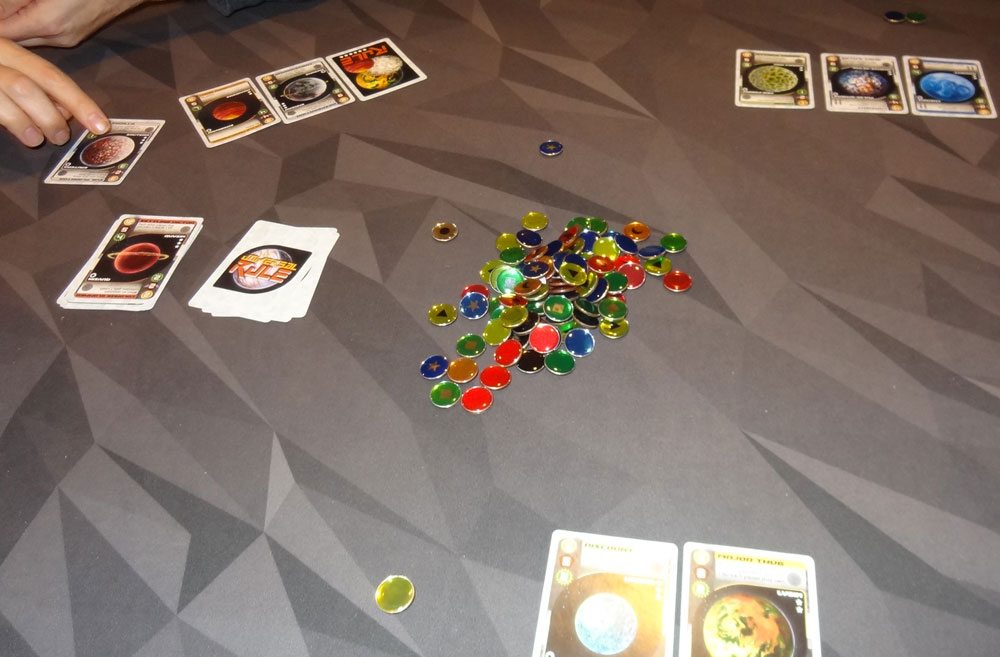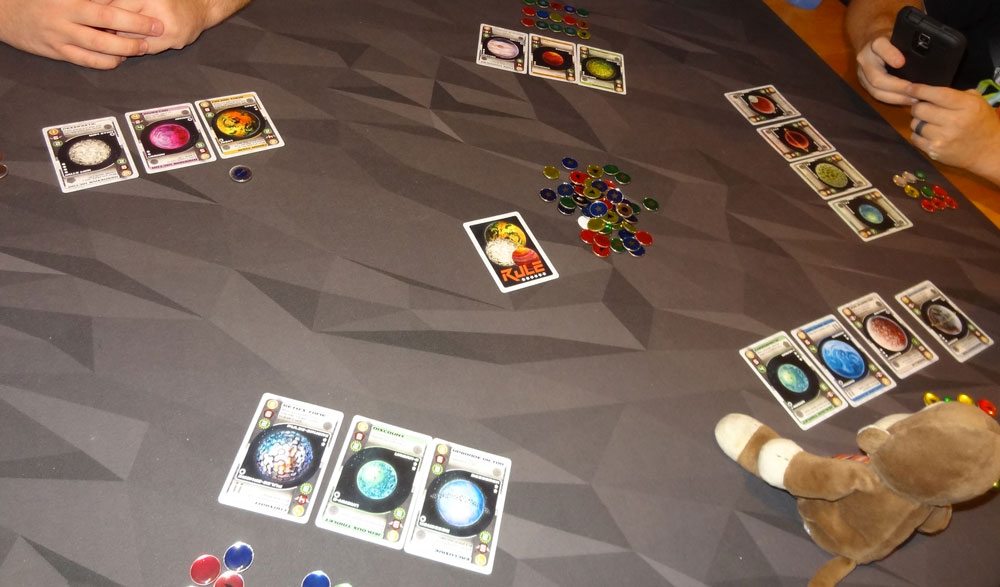Explore deep space and colonize planets; upgrade your technology to gain more military might or strengthen your economy; attack your opponents to become the Universal Ruler! All this—in only 18 cards.
At a glance: Universal Rule is a microgame by Chip Beauvais for 3 to 5 players, ages 12 and up, and takes about 30–45 minutes to play. It’s currently on Kickstarter, with a pledge of $10 for a copy of the game (or $3 for the print and play). The game is part of Button Shy Games’ line of wallet games, which come in a small vinyl wallet and typically have a small set of cards and components, making them ultra-portable.
New to Kickstarter? Check out our crowdfunding primer, and visit our curated page for more projects we love.

Components
- 17 Planet cards
- 1 Universal Rule card
- Wallet package
Players will need to provide their own markers or method for tracking credits, up to a maximum of 25 per player.
The wallet is a simple vinyl bifold that holds cards on each side. My prototype uses the Button Shy wallet, but the final product will have the Universal Rule logo on it instead.

Each of the planet cards has two orientations, with different costs, military power, income, point values, and special ability. The special abilities are, for the most part, pretty easy to interpret.
How to Play
The goal of the game is to end your turn with at least 15 points, which come from planets, credits, and the Universal Rule card. Level 1 planets are worth 1 point and level 2 planets are worth a varying number of points. Credits are worth 1 point for every 5 credits. The Universal Rule card is worth 6 points.
To set up, shuffle the planet cards and deal 3 to each player. Each player chooses two to keep in their starting hand and shuffles the third back into the deck. The Universal Rule card is set in the center of the table, and each player gets 3 credits.
Your maximum credit limit is 5 times the number of active planets you have (with a minimum limit of 5 credits). If you ever get more than your credit limit, you must discard down to your limit immediately.

On your turn, you get to choose 1 action:
- Explore: Pay 1 credit to the bank, and draw 1 card from the deck.
- Colonize: Pay credits to the bank to play 1 planet in front of you face-up. (You may colonize either level 1 or level 2, as long as you can afford the cost.)
- Upgrade: Upgrade 1 of your level 1 planets to level 2 by paying the difference in costs to the bank.
- Produce: Earn income from the bank by adding up the income level on your active planets. (If you have no planets, you earn 2 credits.)
- Attack: Choose one of your planets to attack another player’s planet. (More details below.)
Before you resolve your action, you also choose a follow cost—the minimum is 1, and the maximum is the number of active planets you have. (If you have no planets, the follow cost is 1.) Each player in turn order may pay you the follow cost in order to take the same action you chose. If they decline, they may take 1 credit from the bank. Any of the actions may be followed except attacking.

Attacking is the most complex action, and involves all of the players. The attacker chooses which of their own planets to attack with, and then specifies an opponent’s planet to attack—these two planets are now engaged, and will each contribute their military power (the red pentagon) to the battle automatically.
Going clockwise and starting with the attacker, each player may place any number of cards from their hand face-down on the table. These cards will contribute their fleet value—the level 1 military power of the planet—to the battle, and will be discarded. Finally, everyone may contribute credits toward the battle, up to their fleet limit: add up all of the fleet values of your non-engaged planets to find your fleet limit. This contribution is done simultaneously: everyone picks the amount they would like to contribute secretly. Then, simultaneously, everyone reveals their credits and the non-engaged players point at which player they are supporting with their cards and/or credits. Add up the total value on both sides: the highest total wins, and the defender wins ties.
- If the attacker won, the planet is destroyed if was a level 1, or downgraded if it was a level 2. In addition, whichever player contributed the most value (in military power, cards, and credits) takes the Universal Rule card. In case of a tie, the card does not move.
- If the defender won, planets are unaffected. Each player who supported the defender and contributed at least one card or one coin gets a free explore action, taking a card from the deck. Also, if the attacker had the Universal Rule card, it is returned to the center.
All cards and credits contributed to the battle are discarded.
If, at the end of your turn, you have at least 15 victory points, you win the game.

The Verdict
I really like the idea of doing more with less, and I really enjoy seeing what can be done with just a handful of cards. The cards in Universal Rule have multiple uses, as you’d imagine in a game with only 18 cards. The planets each have two versions, but they can also be used to contribute to battle. And each planet that you’ve colonized gives you points, income, military power, and some special ability (though some are more like penalties, depending on the planet).
There’s a good mix of planet powers and stats—some planets are great at generating income; some add a lot of value to your fights; some protect you from attackers. There are a couple of planets with “glommer” powers, which will let you take 1 credit from the bank every time an opponent does a particular action.
The turns (other than attacking) are fairly simple, and like other games in which one player chooses an action and everyone gets to follow, it does seem like one of the key tactics is choosing an action that benefits you but helps your opponents as little as possible. For instance, if you choose Produce at a time when your opponents are already at their credit limit, then they won’t get anything—not even the 1 credit for not following. Setting the follow cost can also be an interesting exercise in economics: do you set it low, hoping to make a couple bucks while other players follow, or do you set it high so that nobody else can take an action during your turn?
Attacking is a bit involved, and isn’t always easy to explain the first time around. In particular, it can be tricky to figure out when it’s worth it to attack, or when to contribute to somebody else’s fight. The thing is, the Universal Rule card is worth 6 points—that’s the single largest source of points in the game, so it’s incredibly powerful. But, of course, if you have the Universal Rule card, that makes you a target for everyone else.
At the same time, when there’s an attack happening, the non-engaged players have to decide whether to contribute, and which side to support. Supporting the attacker is useful only if you think you can out-contribute them, so that you get the Universal Rule card yourself. If you can’t outspend them, supporting the defender may be valuable both to prevent the player from taking the Universal Rule card, but also so you can draw a card for free.
One issue I ran into was that in the 5-player game, we ran out the deck and then we felt a little bit stuck: if you’ve got enough points in planets, you may be able to get all the way to 15 by accumulating a lot of money for the rest of the points, but if there aren’t any other cards to draw, your options are limited. Plus, if all of the planets have been played on the table already, nobody can contribute much in the way of fleet cards. There is a planet that gives bonus points if the deck is empty, but a lot of the other powers become less useful, which can make you feel like you don’t have much of a choice of actions when it comes to your turn. For the 5-player game, I think it would have been nice to have a few more planets to shuffle in—the add-on bonus packs may fix that, though my prototype did not include those so I can’t say for sure. The game felt a little more interesting to me with 3 players. (I didn’t get a chance to play with 4, unfortunately.)
Overall, I think Universal Rule is a cool concept—a tiny 4x-style game that fits in your pocket—and if you like small games, you should check it out. The $10 price seems fair in the US, though added shipping costs for the rest of the world make it a little pricey for a tiny game—it may be worth considering the print-and-play option if you are outside of the US.
For more information or to pledge for a copy, visit the Universal Rule Kickstarter page!
Disclosure: I received a prototype of this game for review purposes.



